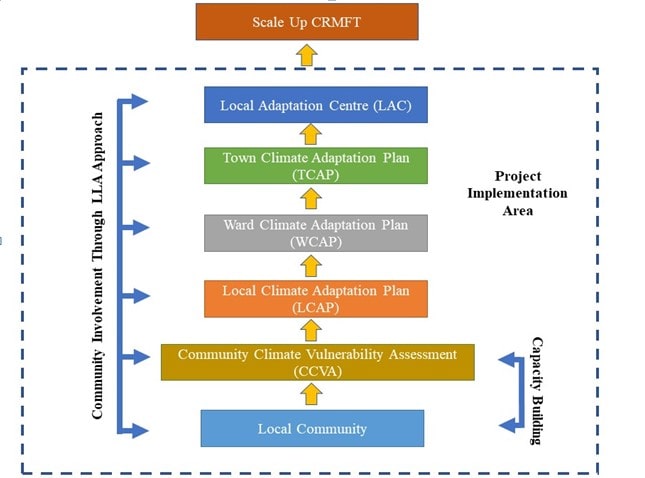Full Project Name: Climate Resilient Migrant Friendly Town (CRMFT) through Locally Led Adaptation
Donor: GCA and UKAID
Partner: BRAC (UDP)
Objectives: Ensuring local governments and urban residents are in the driving seat for the design, planning, implementation, and monitoring of adaptation and climate resilience efforts, including in the initial mapping of local climate change risks and vulnerabilities.
Duration: 2023-July 2025
Project Member: Md. Hafizur Rahman- Project Manager; Farhin Rahman Reeda- Research Officer; Munia Tahsin- Research Officer.
Project Implemented Area: Mongla Port Municipality, Kuakata Municipality, Patuakhali Municipality, Borhanuddin Municipality
Project Background: Human mobility, in the form of displacement and migration, has emerged as a critical global concern in the face of accelerating climate change. Bangladesh, situated on a dynamic deltaic floodplain, is particularly vulnerable. Each year, increasing climate-related hazards—including frequent flooding, riverbank erosion, cyclones, and storm surges—disrupt lives and livelihoods, forcing many to migrate in search of safety and stability.
This large-scale climate-induced migration often results in overcrowding in megacities, intensifying pressure on already limited urban resources, infrastructure, and services. Simultaneously, this phenomenon sidelines the untapped potential of the migrants’ areas of origin, which remain under-resourced and underdeveloped.
In response to this growing crisis, the late Prof. Dr. Saleemul Huq, Director of the International Centre for Climate Change and Development (ICCCAD), proposed a visionary solution on various international platforms: What if we could make secondary towns and climate-vulnerable communities more resilient, so people could choose to stay rather than be forced to leave? This question laid the foundation for a transformative initiative—”Building Climate-Resilient Cities through Locally Led Adaptation (LLA)”.
Funded by the Global Center on Adaptation (GCA), and implemented on the ground by BRAC and Urban Development Programme (UDP), with ICCCAD serving as the knowledge partner, this initiative operationalized locally led adaptation through a structured and inclusive planning process.
Project Process: The approach was implemented in three key phases:
- LCAP (Local Climate Adaptation Plan) – Engaging with the most vulnerable communities to identify context-specific climate risks and locally driven adaptation solutions as well as engage them to develop a tailor-made planning for them.
- WCAP (Ward-Level Climate Adaptation Plan) – Expanding the LCAP to develop comprehensive, ward-level plans, ensuring no vulnerable areas are left behind.
- TCAP (Town-Level Climate Adaptation Plan) – Consolidating ward-level plans through multi-stakeholder consultations, expert inputs, and institutional collaboration to create an integrated municipal-level (Town) adaptation roadmap/plan.
Launched in 2023 and completed in July 2025, the initiative was successfully piloted in four climate-vulnerable municipalities: Mongla, Kuakata, Patuakhali, and Borhanuddin. These towns now stand as compelling examples of how community-driven, locally led adaptation can create climate-resilient urban
futures, mitigate displacement pressures, and empower communities to thrive in place rather than being forced to move.





